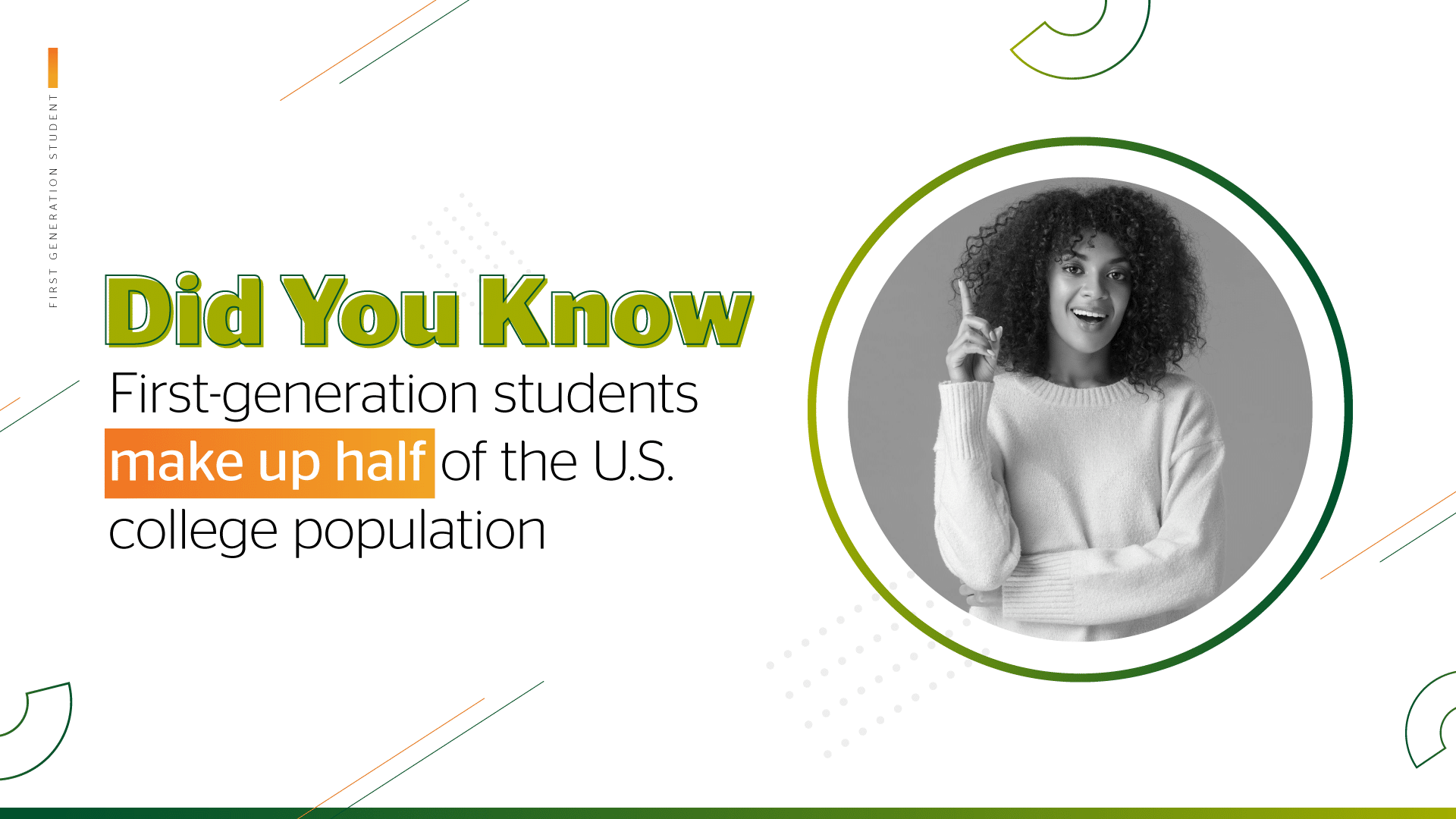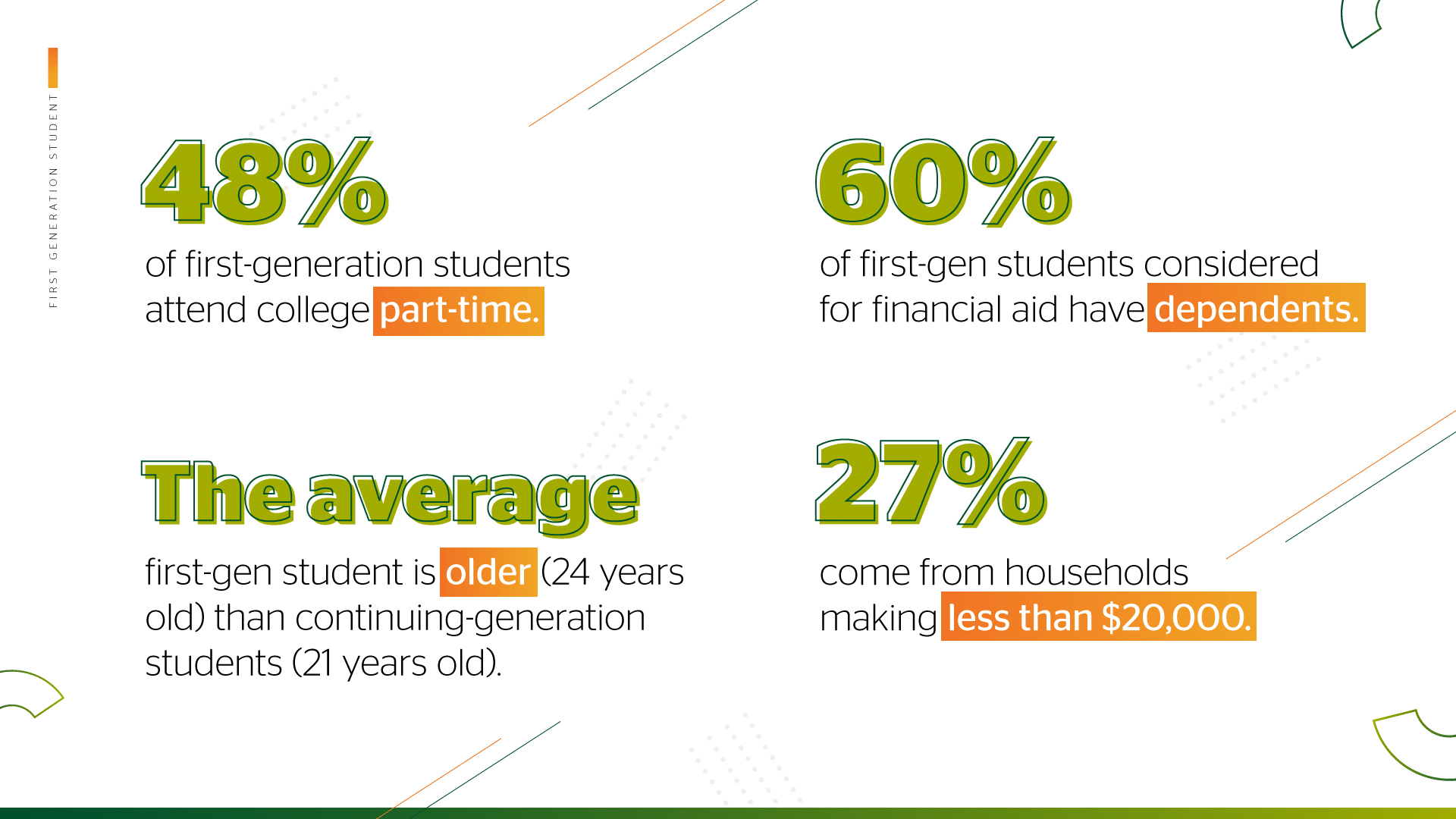Being the first at anything ignites a common human emotion—a fear of the unknown. As “the first,” you’re figuring it out as you go, unsure if your next move is the right one. It takes courage and passion to be the first within your close social circle to travel alone to another country, run a marathon, start a business, or even be the first in your family to go to college.
As the first in their family to attend college, first-generation students face the unique challenge of having to learn as they go. They don’t have intimate knowledge of the systems and the resources available to them. Without this knowledge, students miss valuable information along with the opportunity to take advantage of the support and resources available to them. But even with these obstacles set in front of them, first-generation students remind us that commitment and community are key components to success, whether they’re deciding between a college education or a fast-track bootcamp.

The Struggles of First-Generation Students
When first-generation students decide to take that first step and face the emotional, academic, and financial challenges that may come their way, they begin a path towards becoming leaders who turn obstacles into skills.

Sacrifice
According to pnpi.org, 48% of first-generation students attend college part-time, and average older than continuing-generation students (24 and 21, respectively). 60% of first-gen students considered for financial aid have dependents and 27% come from households making less than $20,000. The odds against this group of students are clear, but entering the unknown world of higher education can be eased with dedicated support, not only from friends and family but also from the instructors and student services committed to their success. To be a first-generation student means knowing the value of work ethic and understanding that sacrifices are necessary when there is so much on the line. Even though the odds are stacked against them when only 48% of first-generation students are likely to graduate on time, they strive to achieve their dreams of quality education and fulfilling career to make the sacrifices worthwhile.

Learning As They Go
Without the guidance of someone who has experienced the academic system, first-gen students need to figure out what many would consider “the basics” on their own, like how to apply for financial aid, securing transportation, and important deadlines for course selection. A first-generation student has to navigate the typical college workload on top of figuring out how to get the most out of their experience. Not knowing how to navigate this previously unknown world or feeling like they can’t ask for help is a common obstacle for first-gen students, which is why a hands-on learning environment, like an industry-specific bootcamp, makes learning on their own feel manageable.
Hands-on training gives students access to learning resources like simulation labs and expert-led courses to offer real-world scenarios and develop critical problem-solving skills while making learning less of a hassle for students from all experience levels.

Pushing Through Fear and Uncertainty
Language barriers, isolation, cultural differences, and other factors can feed insecurities and even lead students to develop impostor syndrome. While many first-gen students acclimate well, there is a certain level of fear that this group of students need to overcome. It’s easy to feel like giving up after earning a low grade on an exam when they already don’t feel comfortable communicating with a professor during office hours—that’s more likely the case for first-generation students than for continuing-generation students.
With a personalized support system of career coaches and industry professionals who know the missteps our learners need to avoid, students can focus on their coursework knowing someone is watching out for them.

Access to Support and Resources
Studies show that 20% of eligible students don’t apply for financial aid and another 36% have to take remedial classes. These compounding setbacks often mean that first-gen students spend a lot of time and effort playing catch up, which often means missing out on the full “college experience” in order to just get by. If first-gen students find it difficult to ask for help, it’s easy to see why so many resources go unused. Understanding their options and having a plan for success levels the playing field and gives already disadvantaged students the confidence to face the challenges ahead.
Students who use the resources available are at an advantage; however, without a support system to keep them accountable and focused, it’s difficult to make it through the inevitable rough patches. Whether it’s family, a group of friends, or an academic support system, students who have access to supportive communities perform better than those who don’t.

Impacting Future Generations
61% of first-generation graduates want to give back to their communities. We can all benefit from investing in quality education to reap the rewards of the different experiences and perspectives that first-generation students carry. While we see initiatives from famous first-generation students, like Oprah and Sonya Sotomayor, even those who don’t have a spotlight on them can strive to provide their communities with the resources and support they need.
There’s something about first-generation students that makes them socially conscious. Their experiences have given them a lens from which to view the world and identify hardships that they can potentially ease. Learning from those who came before them and paying it forward with the next generation of learners is what creates a lasting impact.

Pursuing something for the first time can feel daunting but there are ways that first-generation students can achieve more than they ever thought possible. Ask all of the questions, connect with peers on a similar career path, and find a stable support system to lean on when the obstacles feel too heavy to manage.
Being the first doesn’t mean being alone, it means having the courage and willingness to change the course of your own future.
Start Your Journey Today
If you’re a first-generation student looking for an education that will catapult you into the career of your dreams, the University of Miami Digital Skills Bootcamp can lead the way! Our unrivaled student support, career services, and a team of expert instructors are committed to transforming students into professionals who leave their mark and make an impact.



